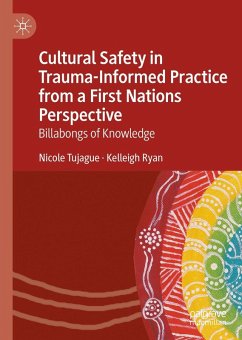This book provides an accessible resource for conducting culturally safe and trauma-informed practice with First Nations' peoples in Australia. Designed by and for Australian Indigenous peoples, it explores psychological trauma and healing, and the clinical and cultural implications of the impacts of colonization, through an Indigenous lens.
The authors recognise trauma at the heart of all Indigenous disadvantage, and explore types of trauma in the context of Indigenous, collective cultures. The chapters take an Indigenous 'Yarning' approach to sharing knowledge, and encourage readers to challenge their unconscious, long-held beliefs and worldviews. Nicole Tujague and Kelleigh Ryan identify the differences between mainstream systems and more holistic Indigenous understandings of social and emotional health and wellbeing and outline a meaningful practice framework for practitioners. They analyse types of complex trauma, including intergenerational, institutional, collectiveand historical trauma; and discuss the impacts of racism and the concept of 'cultural load'. They also address vicarious, or "compassion" trauma experienced by front line workers and carers; and offer insights into their experience of working with collective healing programs.
This book is essential reading for Indigenous practitioners and service providers to Aboriginal and Torres Strait Islander people. It is also a valuable resource for students likely to work with First Nations' peoples within a broad range of health and social science disciplines.
Nicole Tujague is one of the two founding directors of The Seedling Group, a consultancy that offers training on cross-cultural safety and trauma-informed practice, particularly in First Nations contexts. She has a Bachelor of Indigenous Studies and is completing a PhD in Indigenous Evaluation Methodology from Australia's Southern Cross University (SCU).
Kelleigh Ryan is Director and Consulting Psychologist for The Seedling Group, a Fellow of the Australian Psychological Society and Vice Chair of the Australian Indigenous Psychologists Association. She completed her degree in psychology at Griffith University in Brisbane, Australia.
The authors recognise trauma at the heart of all Indigenous disadvantage, and explore types of trauma in the context of Indigenous, collective cultures. The chapters take an Indigenous 'Yarning' approach to sharing knowledge, and encourage readers to challenge their unconscious, long-held beliefs and worldviews. Nicole Tujague and Kelleigh Ryan identify the differences between mainstream systems and more holistic Indigenous understandings of social and emotional health and wellbeing and outline a meaningful practice framework for practitioners. They analyse types of complex trauma, including intergenerational, institutional, collectiveand historical trauma; and discuss the impacts of racism and the concept of 'cultural load'. They also address vicarious, or "compassion" trauma experienced by front line workers and carers; and offer insights into their experience of working with collective healing programs.
This book is essential reading for Indigenous practitioners and service providers to Aboriginal and Torres Strait Islander people. It is also a valuable resource for students likely to work with First Nations' peoples within a broad range of health and social science disciplines.
Nicole Tujague is one of the two founding directors of The Seedling Group, a consultancy that offers training on cross-cultural safety and trauma-informed practice, particularly in First Nations contexts. She has a Bachelor of Indigenous Studies and is completing a PhD in Indigenous Evaluation Methodology from Australia's Southern Cross University (SCU).
Kelleigh Ryan is Director and Consulting Psychologist for The Seedling Group, a Fellow of the Australian Psychological Society and Vice Chair of the Australian Indigenous Psychologists Association. She completed her degree in psychology at Griffith University in Brisbane, Australia.
Dieser Download kann aus rechtlichen Gründen nur mit Rechnungsadresse in A, B, BG, CY, CZ, D, DK, EW, E, FIN, F, GR, HR, H, IRL, I, LT, L, LR, M, NL, PL, P, R, S, SLO, SK ausgeliefert werden.


